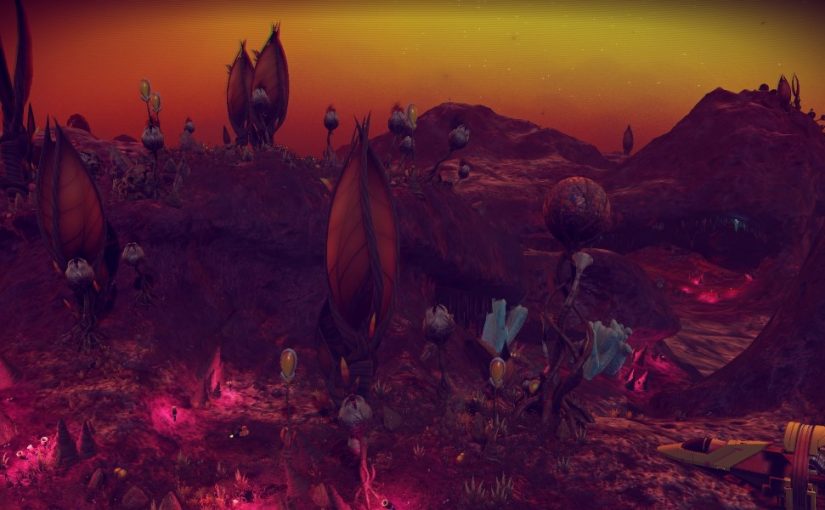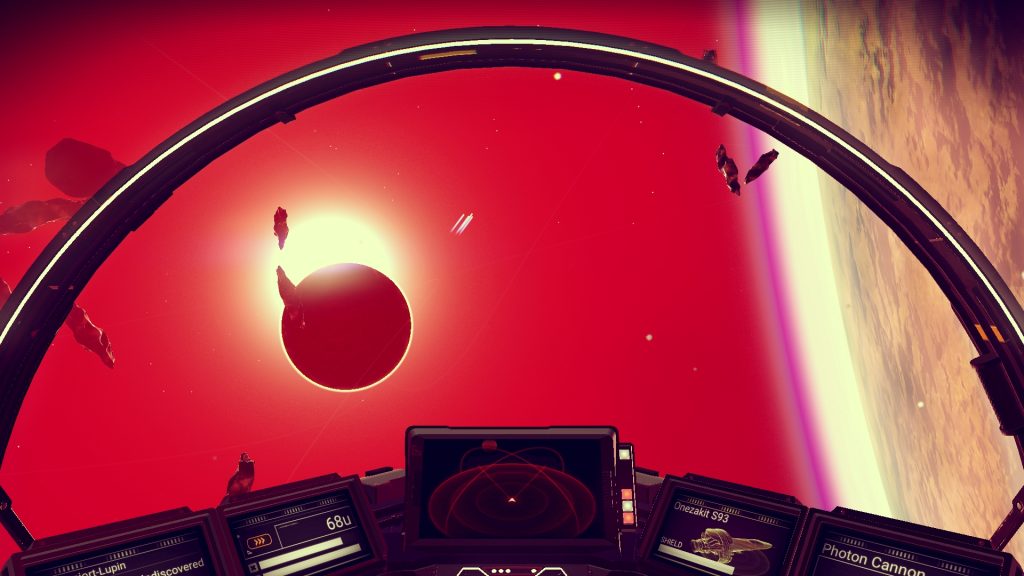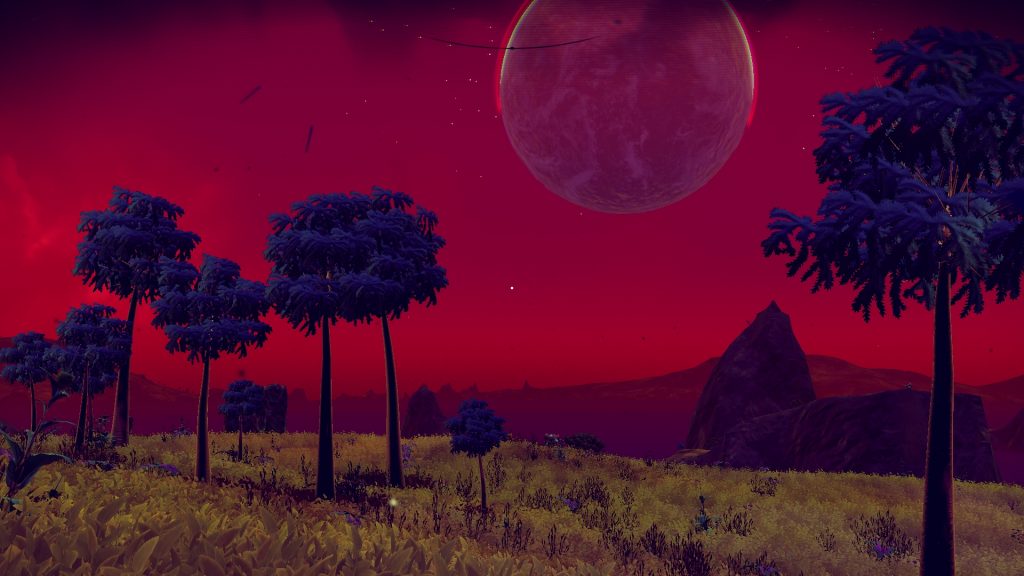I haven’t written about a game in quite a while, but I definitely felt inspired after spending my week with No Man’s Sky.
I don’t tend to get excited about upcoming games. That feels like a depressingly adult thing to say, but building up expectation when disappointment is so likely seems like a masochistic way of life.
No game taught me this lesson better than Fable. As a kid, I vividly remember reading a now-infamous interview with Peter Molyneux, where he was hyping up Fable. He talked about how the whole world responded to your actions. Knock an acorn to the ground and come back years later to see a fully grown oak tree. Become evil and knights in shining armor would try to hunt you down, or be righteous and fend off bounty hunters and crimelords. Build houses, get married, raise a family, rule the land.
Fable had none of those things. The spirit of the game that was described – an open-ended journey full of countless, unique possibilities – was not present in the slightest. It was a cramped museum of strict and compromised designs. It wasn’t a bad game at all, but it was nothing like what had been promised. It utterly failed to capture the spirit of its promise.
Right around this time was when I first encountered the word procedural, one of the buzzwords that has seen a resurgance alongside No Man’s Sky. In this context, it refers to a world that is generated by formulas and processes, rather than explicitly designed by a human. I heard of this when Will Wright delivered a brilliant GDC presentation on Spore. The game he laid out in that talk was genuinely incredible. He shows a thoughtfully populated universe at several distinct scales, continuously filled out with player creations, crafted by incremental choice, guided evolution. Where Peter Molyneux talked, Will Wright demonstrated in precise detail.
At that time, I was like 15 and had no way of knowing how outrageous the game’s many promises really were. By the time the game came out – a full 3 years later – it was clear it had become mired in development hell and irrevocably damaged by the production process. The game that was released was, like Fable, nothing akin to the vision that had been laid out.
I talk about these games because No Man’s Sky has similarly excessive ambitions. It has an awe-inspiring trailer that immediately generated huge amounts of interest. There’s been countless interviews with the lead developer where he clumsily evades questions while simultaneously stirring up visions of a grand universe with complex interactions and infinite possibilities. But unlike Fable and Spore, No Man’s Sky actually does some justice to this goal.
First, let’s get the negative stuff out of the way. Because for me, getting to the pearls in this game has meant swimming through oceans of hot garbage. Swim with me for a minute, if you will.
Far and away, the most common thing you will spend your time doing in this game is moving piles of exotic sand between inventories. To worsen matters, the interface for managing your sand collection is just no good.
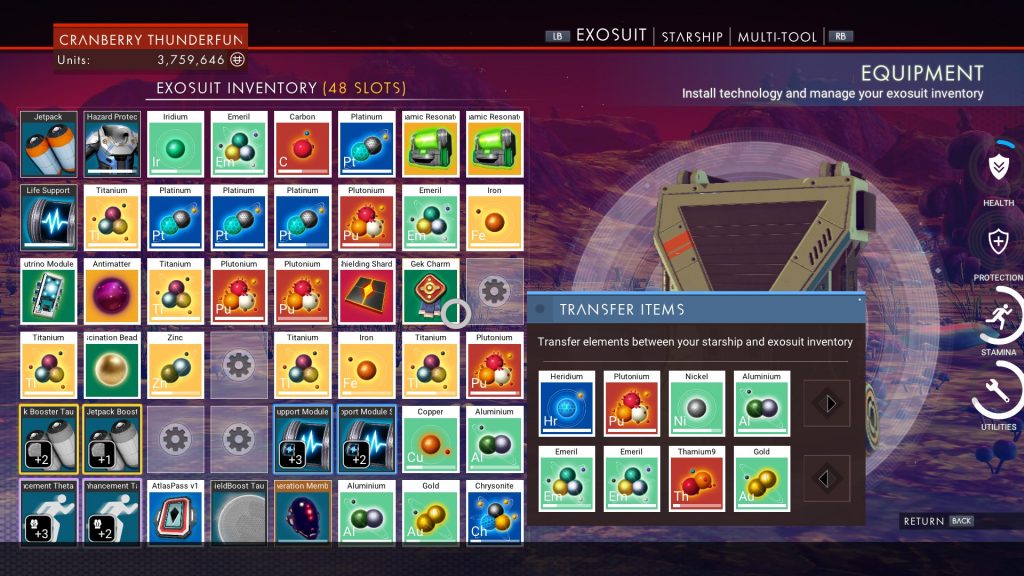
As someone who earns his salary designing and building interfaces, I cannot tell you how little this differs from getting punched in the nuts by each and every member of the 2016 American Olympic team (that’s 558 people, in case you were about to check).
The focus on collection and crafting with this space dust is oppressive. In a game whose soul is all about exploration, to find yourself wedded to the act of vacuuming up shit particles everywhere simply feels wrong. In any other game this might be considered a novel or satisfactory piece of gameplay, but this is No Man’s Sky. There are quintillions of planets begging for exploration, but there you are, unmoving, unthinking, as you squirt lasers on a pillar of galactic fartrock.
Lastly, it must be mentioned how hilariously insufficient – perhaps even inappropriate – the aliens are. Hundreds, if not thousands, of these off-brand Walmart humanoids populate every planet and solar system in the galaxy.
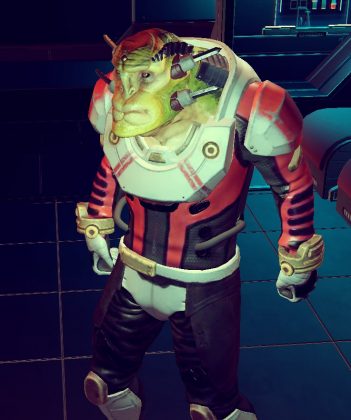
They’re grotesque, poorly animated, and devoid of personality. Most of them are apparently chair-bound, born with an Ipad strapped to their right hand, which they idly peck at before delivering a completely arbitrary multiple choice question. It’s a feature of the game so breathtakingly vanilla, yet somehow so incomplete, that one can only wonder what the developer’s intentions might have been.
It forces you to think of the game as actually being empty, simply devoid of intelligent life. That’s a meaningful distinction, too. If there are no larger civilizaitons or structures waiting out there in the universe, what can this universe really show you? What is the drive for exploration?
The answer to that, for me, is the phenomenal variety of planets. Let me break this down a bit, because this has been a huge part of the sense of awe I get from this game.
Blasting around in a solar system feels great – they nailed the scale and speed of it all. Planets feel huge and distant, but you still feel fast. There’s a bit of magic in getting jumped by space pirates and dogfighting among asteroids with a whole planet as your backdrop.
It’s taken for granted that you can enter a planet’s atmosphere from any direction, but think of any game you’ve ever played – you’re always going through explicitly defined entry and exit points wherever you are. In No Man’s Sky, this experience, which would be a blank loading screen in any other game, is genuinely fun. All the alarms go off, everything shakes, there’s a lovely halo of plasma, and the features below fade into view. You can start to make out some of the features – gray soil, purple grass, green oceans. Garish, but still kinda badass.
You cruise around for a minute until you find a landmark that interests you. It’s a little hard to see from your cockpit, so you spin your ship so that you’re flying sideways and can see the terrain a little better. You fly really fast compared to how you walk, so you have to slow down and start pulling tight circles until you think you’ve got it right. Your ship slowly lowers, and now you get a sense of the scale of the hills you saw from above, which now loom all around you.
This planet has giant mushrooms three times your size, there’s little crab-squid things galumphing around on the ground, and apparently it’s lightly raining acid. There’s a new type of tree you’ve never encountered before at the top of a big hill, so you decide to head that way to take a closer look. On the way you find a species of butt-faced dinosaurs that try to kill you but they can’t quite path around some tentacle flowers so you laugh at them and move on. As you crest the top of the hill, you see a sky filled by a neighboring planet and contrails left by alien spaceships. The view below is a canyon filled by a lake, filled to the brim with platypus-like squiddies and mushrooms with wavy tendrils. The sun starts to rise behind you, and the landscape changes from being heavily tinted green-blue, to a softer orange-red.
If this sounds awesome, that’s because it is. No, not every planet is that great. Many of them are shitty. Some of the patterns in generation become more obvious over time. The interest in exploration goes down once you don’t need to collect resources or upgrades any longer.
The fact remains that No Man’s Sky contains so many stunning compositions of colors and shapes, intermingled with all sorts of comedic and bizarre creatures. No designer sat down and created any one of them specifically, yet many of the environments in No Man’s Sky are far more beautiful than anything you can find in any modern game. I would go as far as to suggest that this is one of the most intrinsically beautiful games ever made.
There are moments in this game that genuinely made me feel like Darwin visiting the Galapagos. I could imagine his excitement at finding all these new and fascinating kinds of plants and animals, trying to piece together a narrative about why they have these sorts of claws or that sort of beak. That’s the heart of exploration, and No Man’s Sky captures that in a way that no other game has.
This kind of novelty is why procedural generation holds such promise. Games should create unique experiences that were hitherto inaccessible. They should be able to show us things we haven’t yet imagined. No Man’s Sky manages to keep itself together just well enough to do that.
